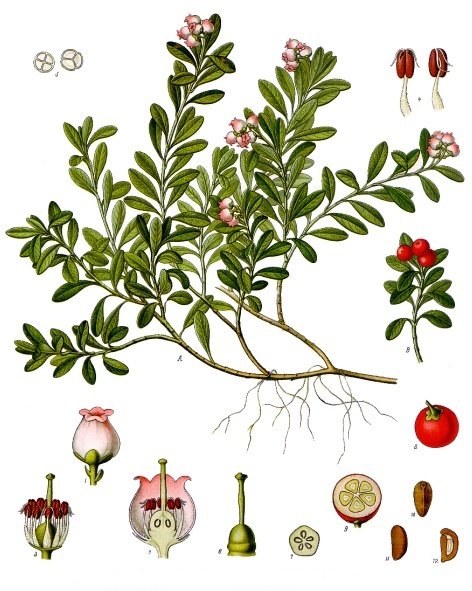Dies ist eine alte Version des Dokuments!
Ericaceae - syn. Arbutus uva-ursi L., Arctostaphylos officinalis Wimm., Arctostaphylos media Greene, Uva-ursi procumbens Moench; common bearberry, bearsgrape, rockberry, upland cranberry, Echte Bärentraube, Moosbeere, Sandbeere
Mat-forming evergreen shrub with rooting branches, 20-60cm high; leaves alternate, obovate to spatulate, leathery, both sides dark green, margins not revolute, lower side of leaves with reticulate venation (leaves of the similar Vaccinium vitis-idaea with oil dots on this side); jug-shaped, nearly globular flowers, white tinged with pink; inflorecence a raceme; fruits are globular, glossy red berries.
Arctostaphylos uva-ursi leaves, bearberry leaves, Folia uvae ursi, Uvae ursi folium, Bärentraubenblaetter
[Hager, Wichtl, DAB10Ko, BI, BHP83, CRC]
Definition. Fast dried leaves of Arctostaphylos uva-ursi, collected in winter or spring. The obovate to spatulate leaves with shiny dark green to yellow-green upper surface own a astringent and slightly bitter taste.
Constituents. Phenolic glucosides, mainly arbutin (the glucoside of hydroquinone, 4-12% or even more) and methylarbutin (0-2.5%), as well as traces of piceoside (salinigrin, p-hydroxyacetophenone-D-glucoside), esters (at position 2 and 4 of the sugar) of arbutin with gallic acid. Sometimes also traces of free hydroquinone can be found. The drug is rich in tannin (10-40% reported), mostly derived from gallic acid and thus hydrolizable. Further constituents are flavanol glycosides like hyperoside (0.8-1.5%), quercitrin, isoquercitrin and myricitrin, free gallic, quinic and ursolic acid, and allantoin.
[DAB10Ko; Hager; CRC; Wichtl; Thieme H, Winkler HJ, Pharmazie, 26, (1978), 235-43; Karikas GA, Euerby MR, Waigh RD, Planta Med., 53, (1987), 307-8; Britton G, Haslam E, J. Chem. Soc., (1965), 7312-19; Herrmann K, Arch. Pharm. (Weinheim), 286, (1953), 515-523; Waehner CH, Schoenert J, Friedrich H, Pharmazie, 29, (1974), 616]
Effects. The drug is astringent. An antibacterial activity of arbutin metabolites in urine against E.coli and Staph. aureus in vitro could be shown only after alkalisation of the urine. An alkaline urine could be achieved in vivo by simultaneous administration of sodium bicarbonate or pure vegetable food.
[Hager; Wichtl; Frohne D, Planta Med., 18, (1970), 1-25]
Uses. The drug is applied to aid the treatment of inflammations of kidneys, ureter and bladder. Also used for polyurea and as astringent for dysentery.
[Hager; Wichtl; CRC; BI]
Side effects. The drug should not be given to children and persons with gastric problems (because of an irritating effect of large doses on gastric mucosa, followed by nausea and vomiting) or heavy diseaes of the kidney. Prolonged intake should be avoided because of liver troubles. [BI; CRC; Wichtl]
Dosage. As decoction, 2g (one spoonful) of powdered leaves with one cup (150ml) of water, four times daily. Another possibility is to let it stand with cold water for several hours (cold macerate). As fluid extract, 2g (single dose).
[Hager; DAB10Ko; Wichtl; BI]
Quality. The drug got mention in DAB10, OeAB90, HelvVII, JPXII and BHP83. The amount of twigs contained in bearberry leaves should not exceed 3-5%, the amount of brown leaves should not exceed 1-5%. Total ash limits - not more than 4-5%, weight loss by drying - not more than 10%.
Storage. Leaves should be stored in airtight containers, protected from light.

Köhler, F.E., Medizinal Pflanzen, vol.2, t.137 (1890)
http://plantgenera.org/species.php?id_species=80754
